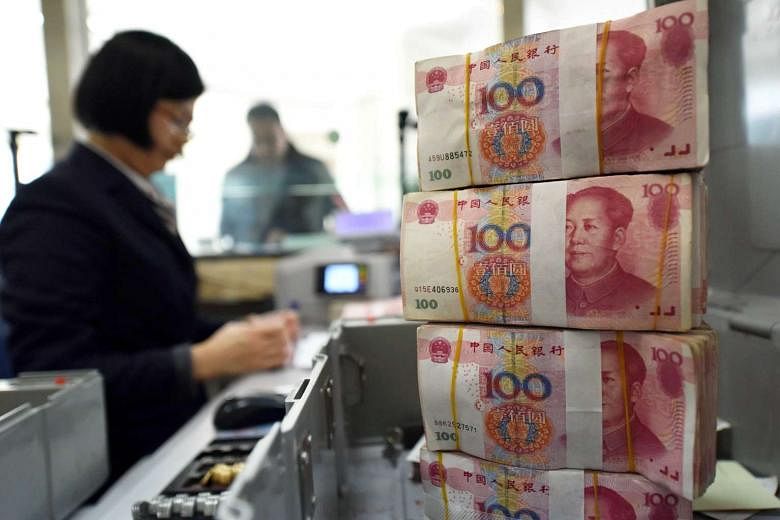BEIJING (BLOOMBERG) - China's foreign exchange reserves fell at a slower pace last month as the nation's financial markets stabilised and policymakers took more steps towards shoring up growth.
The world's largest currency hoard dropped by US$28.6 billion (S$39.29 billion) to US$3.2 trillion in February, the People's Bank of China said in a statement Monday. That was the smallest decline since June and less than the US$40.9 billion decrease expected by economists surveyed by Bloomberg.
China's yuan advanced in February against the dollar after three months of declines, and a domestic stock rout eased, helped in part by a move by policy makers to reassure that they will prevent a hard landing. Leaders gathering for the annual National People's Congress say they're targeting a wider fiscal gap for 2016 to help meet a slightly lower growth target.
"The government has shown clear policy signals to stabilize the currency," said Xu Gao, chief economist at Everbright Securities Co. in Beijing. "This effectively curbed market expectations for further depreciation, and the market has gradually understood."
Policymakers have been burning through their stockpile to help stabilise the currency, a key goal for China's leaders, who are gathering this week for their annual policy meeting in Beijing. The nation's defense of the yuan depleted its foreign reserves by US$513 billion last year, while Bloomberg Intelligence estimates that a record US$1 trillion of money moved overseas in 2015.
Persistent capital outflows from China since mid-2014 were probably driven more by local companies paying down dollar- denominated debt in anticipation of a stronger U.S. currency than by investors ditching assets, according to the Bank for International Settlements.
PBOC Deputy Governor Yi Gang said at a news briefing Sunday in Beijing that reserves will stay at a "reasonable level", but a further drop wouldn't be surprising. He reiterated that the yuan will be stable against a basket of currencies, and there's no basis for a persistent depreciation in the currency.
Premier Li Keqiang's work report delivered Saturday at the start of the annual National People's Congress showed the government will give top priority to development by boosting innovation, urbanising more and cutting excess capacity in industries like coal and steel. He also outlined a 6.5 per cent to 7 per cent target range for economic growth, with 6.5 per cent as the baseline through 2020. Last year's expansion was 6.9 per cent.
To reach the new target, China plans to permit a record high fiscal deficit and has raised its money supply expansion target. That means debt grows even as growth slows.
China's leaders also are working to rein in risks to the economy. Regulators plan to impose new rules to end the practice of home buyers taking out loans to cover down-payments, according to people familiar with the matter. The rules will bar lenders including developers and housing agencies from offering loans for down-payments, said the people, who asked not to be named because the matter isn't yet public.
Still, more declines may be in store, according to Zhao Yang, chief China economist at Nomura Holdings in Hong Kong. China will intervene in the currency market less in the short term, yet may need to do so more later this year if volatility returns, Zhao said. Outflow pressures will remain intact amid "oversupply in real estate and overcapacity in manufacturing that lead to further slowdown of economic growth", he said.

